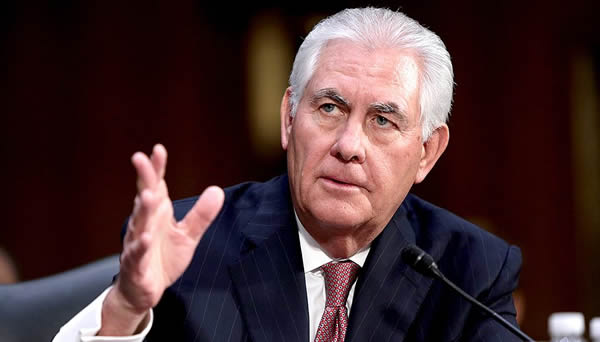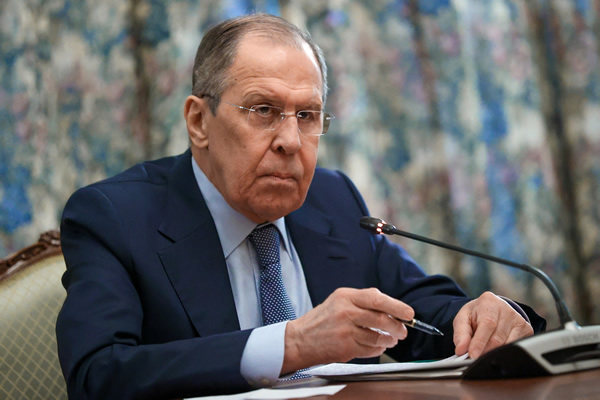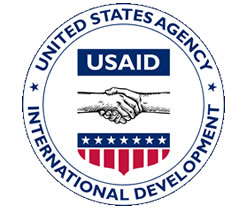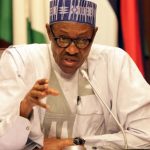
US Secretary of State, Rex Tillerson, will make his first official trip to Africa when he visits Chad, Djibouti, Ethiopia, Kenya and Nigeria from Tuesday, March 6 to Tuesday, March 13, 2018.
It will be President Donald Trump’s first significant outreach to a continent his administration has not focused on since coming to power in January, 2017.
Mr Tillerson’s trip is also coming after the controversy involving President Trump describing Africa in vulgar terms.
The US President had informed African leaders about the Tillerson trip in a letter to them during their recent summit in Addis Ababa, Ethiopia.
Having taken so long to turn his focus on Africa amid criticism from some quarters for the delay, it would seem that President Trump is now ready to deal properly with the Continent.
“I want to underscore that the United States deeply respects the people of Africa, and my commitment to strong and respectful relationships with African states as sovereign nations is firm,” President Trump’s letter to the African Union (AU) said.
“The United States profoundly respects the partnerships and values we share with the African Union, member states, and citizens across the Continent,” he said.
In the global fight against terrorism, Africa is increasingly being drawn into the war.
President Trump noted that US troops were “fighting side by side” against extremism in Africa, and that Washington was working to increase “free, fair and reciprocal trade” with African countries.
President Trump’s predecessor, Barack Obama, visited Ghana six months after taking office, and in a speech in Accra railed against “big men politics” on the Continent.
With the Tillerson visit, State Department Spokesperson, Heather Nauert, said: “He plans to discuss ways we can work with our partners to counter terrorism, advance peace and security, promote good governance, and spur mutually beneficial trade and investment.”
He will also hold talks with senior officials at the AU Headquarters in Addis Ababa.
Despite the apparent lukewarm approach to Africa, the Trump Administration has undone former President Obama’s Power Africa project, which was not working because the Obama Administration did not support the use of fossil fuels such as coal to provide electricity.
African countries, with massive coal reserves, want to access the fossil fuel to generate power that will spur the Continent’s economic growth and poverty reduction programmes.
Last year, President Trump urged the international multilateral banks to fund coal projects in developing countries by helping them to access the fossil fuel efficiently and cleanly.
This is an area that African countries and the US are looking to working closely to provide electricity to a continent where more than 600 million people do not have access to power.
Late last year, US Energy Secretary, Rick Perry, was in Cape Town, South Africa for a meeting of African oil and energy ministers.
He used the opportunity to push the idea of President Trump’s clean coal alliance, which would see technology being used to reduce the effect of emissions from the production of fossil fuels.
Mr Perry touched on the problems caused by the lack of electricity in Africa adding;
“Development starts when you have a power supply. That’s my message to Africa.’’
“America is truly your friend and your partner and we’re here to help Africa use fossil fuels and use them cleanly with the world’s newest and best technology,” he said.
Mr. Perry said the US was willing to help countries develop their energy systems “from all sources,” noting the arguments by climate change activists who back renewable energy in favour of fossil fuels.
“You can have both,” he said.
“We need to open debate on these issues and countries in Africa must be free to choose which way they want to go.
“My showing up here is about US support for Africa.
“We will invest in African energy projects, but it’s also time to let technology be your friend. “We will help this continent make more power, and we will do it cleanly,” Mr Perry said.
Supporters of coal for power are urging countries such as the US to spend more money on carbon capture and storage technologies to reduce greenhouse gas emissions from the production of fossil fuels.
Source: GNA







